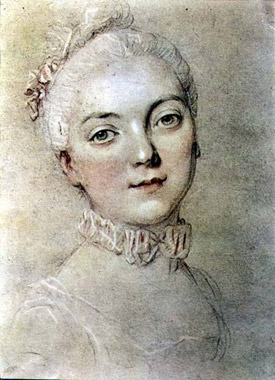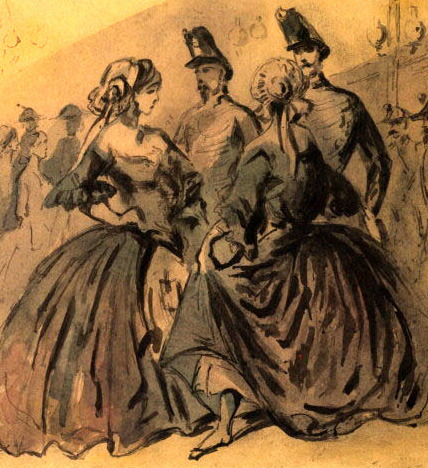19th Century Epic Romances discussion
Les Misérables
>
Part 1: Fantine: Book 2
date newest »
newest »
 newest »
newest »
message 1:
by
Kylie
(new)
Dec 07, 2012 09:37AM
 Please discuss this part of the book here. Label all spoilers please!
Please discuss this part of the book here. Label all spoilers please!
reply
|
flag
 I know. My thoughts exactly! What really annoyed me was that he left Fantine pregnant and alone and had nothing to do with Cosette or Fantine ever again.
I know. My thoughts exactly! What really annoyed me was that he left Fantine pregnant and alone and had nothing to do with Cosette or Fantine ever again.
 you feel so sad for Fantine and her daughter. does anyone one have any prediction about what will happen to her daughter
you feel so sad for Fantine and her daughter. does anyone one have any prediction about what will happen to her daughter
 Anna wrote: "I wonder what he thought when he did leave. Carol?"
Anna wrote: "I wonder what he thought when he did leave. Carol?"Felix only thinks of himself. I don't believe he ever thought about her again. Hugo wrote about every aspect of French society in the 1820s and 30s, and this included every Parisian class, including students. Hugo gives us 2 different views of student lives.
First is Marius & his friends. They are dedicated to the revolution, and the Societe was an important role in their social lives. They were best friends; they laughed and philosophized, ate and drank, and even shared lodgings with one another. They spoke about world politics and their mistresses in the same breath; even when they disagreed they wanted what was best for each other. Hugo saw this as the ideal lifestyle of the student: carefree yet serious and surrounded with like minds.

Marius with Eponine
Hugo also presented a very different idea of student life: Felix Tholomyes, the man who left Fantine poor and pregnant without warning. Felix is a student as well, but he is much older than Fantine, has a large income from his family, and is an amateur poet. When the four students and their grisettes sit in the countryside, Tholomyes shows off his intellect by giving a rambling, impromptu speech making learned references to mythological beauties and comparing them to his female companions. Again over dinner, Tholomyes continues to takes center stage. In the end the men announce to the woman that they have a surprise; they abandon them, heading "back to their papas and mammas . . . to society, to duty and order." This student, in Hugo's view, cares more about his personal future and knowledge than for his responsibility to his pregnant lover.
“Fantine was an orphan. She had emerged from the most unfathomable depths of social shadow, she bore on her brow the sign of the anonymous and the unknown. She was born at M. sur M. of what parents? Who can say? She had never known her father or mother. She was called Fantine. Why Fantine? She had never borne any other name. At the epoch of her birth the Directory still existed. She had no family name; she had no family; no baptismal name; the Church no longer existed. She bore the name which pleased the first random passer-by, who had encountered her, when a very small child, running barelegged in the street. She received the name as she received the water from the clouds upon her brow when it rained. She was called little Fantine. No one knew more than that. This human creature had entered life in just this way.”

“At fifteen she came to Paris "to seek her fortune." Fantine was beautiful, and remained pure as long as she could. She was a lovely blonde, with fine teeth. She had gold and pearls for her dowry; but her gold was on her head, and her pearls were in her mouth.
She worked for her living; then, still for the sake of her living,-- for the heart, also, has its hunger,--she loved. She loved Tholomyes. The love of Fantine was a first love, a sole love, a faithful love. She alone, of all the four, was not called "thou" by a single one of them. Fantine was one of those beings who blossom, so to speak, from the dregs of the people.” The other women were “Grisettes” and Fantine was the naive one of the bunch.
In the first quarter of the 19th century, "Grisette" also came to refer more specifically to the independent young women, often working as seamstresses or milliner's assistants, who frequented bohemian artistic and cultural venues in Paris. They formed relationships with artists and poets more committed than prostitution but less so than a mistress. Many grisettes worked as artist's models, often providing sexual favors to the artists in addition to posing for them. During the time of King Louis-Philippe they came to dominate the bohemian modeling scene. Although the grisette models were perceived to be adventurous, and independent, they sought not only economic support, but also emotional and artistic support in their relationships with bohemian men.

Grisettes like Favourite, Dahlia, and Zephine "would all be in low cut dresses, which looked so appealing in this time of year, but Fantine had decided to be bold and different, and wear a gown that had a fairly high neckline. She knew that Felix would find her more seductive that way, and he did."
sorry so long . . .
 Carrol that was a very interesting post and I have to say I learned a lot, so caught in the story that I forget to look up terms. I love that you added pictures to your post as well.
Carrol that was a very interesting post and I have to say I learned a lot, so caught in the story that I forget to look up terms. I love that you added pictures to your post as well. But when I reading the book the comparison between Tholoymus and Marius is very great because father-mother and daughter-son in law relationship is beginning to take shape.
 Fantine a young orphan herself was very naive in the ways of the world, and fell in love with a playboy who never had any intention of honoring any commitment to Fantine. The whole time I was reading this section I kept thinking, "Can't this girl ever catch a break"?! She allowed herself to be taken advantage of twice. Once with loser boy, and the other with the Thenardier's. I wanted to shake her and say "wake up....go check on your daughter"! Hugo really captures the poverty of the times both literal and spiritual. It's also interesting how he was able to write so well about human nature and characteristics both good and not so good. Fantine is a tragic character to be sure, but she is also an integral part for the redemptions process (so to speak) of Jean Valjean who in the end offers a small amount of relief to the greatly suffering Fantine.
Fantine a young orphan herself was very naive in the ways of the world, and fell in love with a playboy who never had any intention of honoring any commitment to Fantine. The whole time I was reading this section I kept thinking, "Can't this girl ever catch a break"?! She allowed herself to be taken advantage of twice. Once with loser boy, and the other with the Thenardier's. I wanted to shake her and say "wake up....go check on your daughter"! Hugo really captures the poverty of the times both literal and spiritual. It's also interesting how he was able to write so well about human nature and characteristics both good and not so good. Fantine is a tragic character to be sure, but she is also an integral part for the redemptions process (so to speak) of Jean Valjean who in the end offers a small amount of relief to the greatly suffering Fantine.



